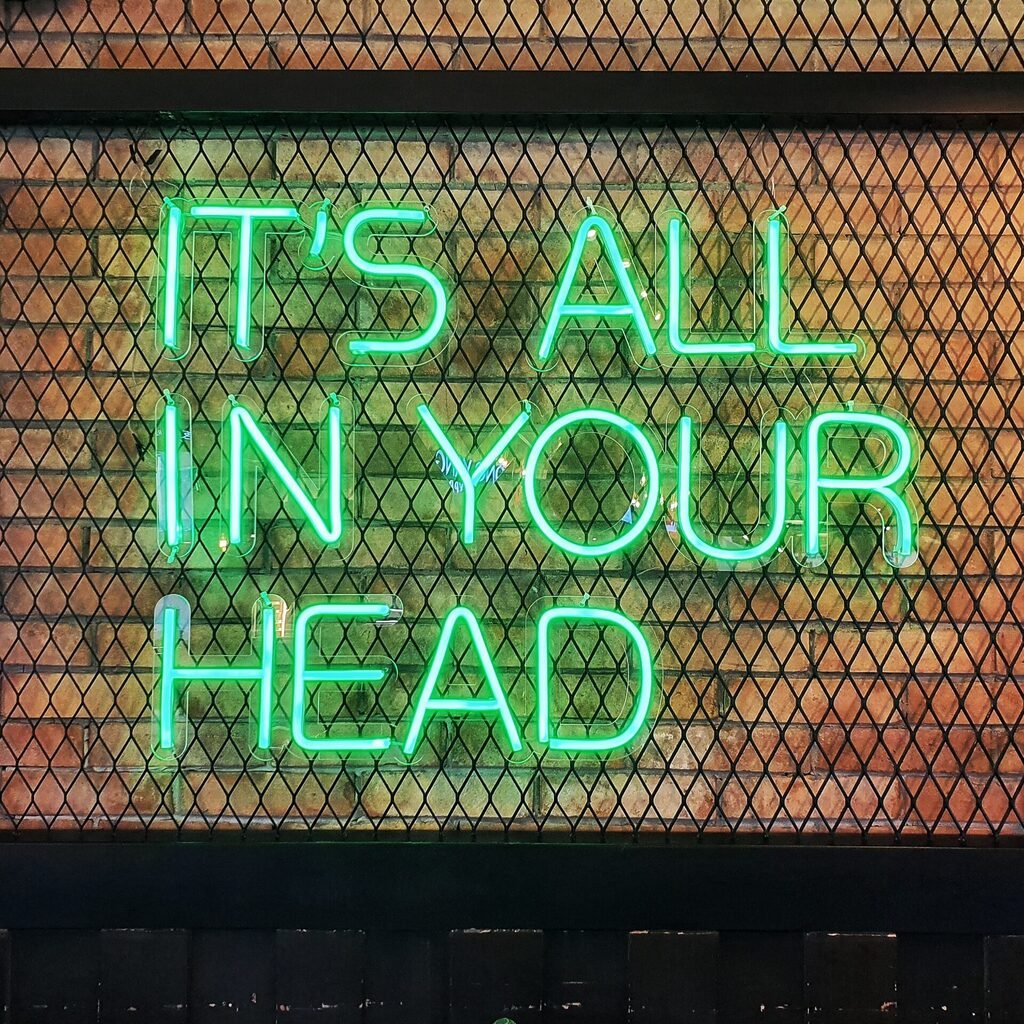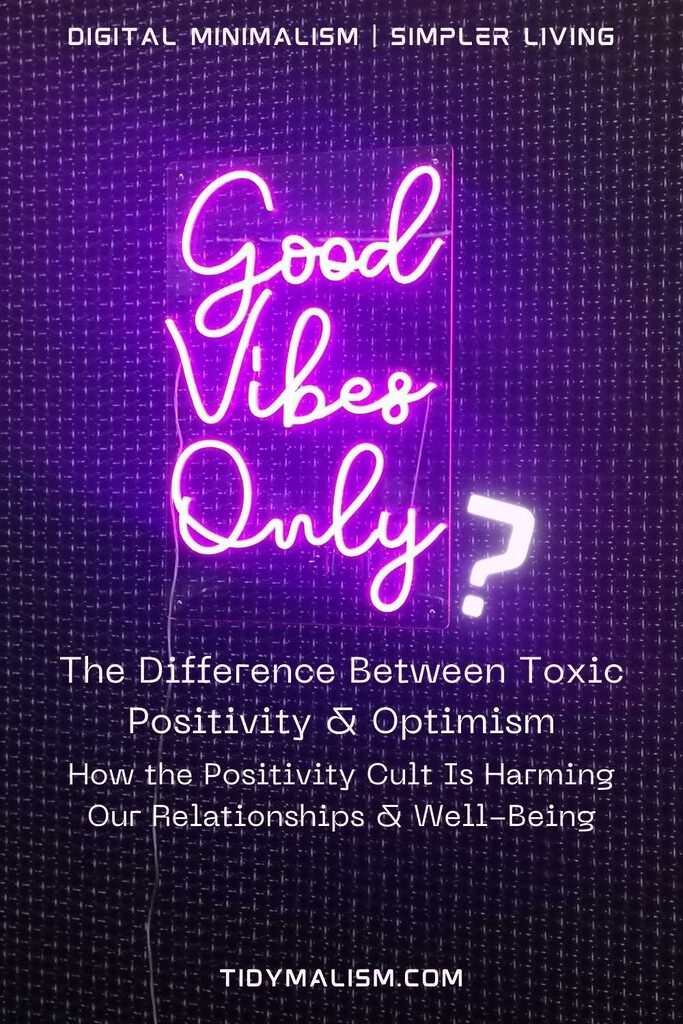At first glance, it might not seem like there’s much difference between toxic positivity and optimism. After all, they both involve remaining positive in the face of adversity, right?
Wrong.
There’s a big difference between the two, and it’s helpful to understand why. In this post, we’ll explore what the difference between optimism and positivity is, and how the “positive vibes only” mindset can actually foster quite the opposite.
Table of Contents
What Does Toxic Positivity Mean?
To understand the difference between toxic positivity and optimism, we need a working definition. Toxic positivity refers to the notion that it is always necessary to be positive and avoid negative emotions at all costs.
This can lead to people downplaying or dismissing their own feelings, as well as the feelings of others. Toxic positivity can also be used as a way to attempt to control or manipulate others, by telling them that they should always be happy and insinuating their negative emotions are wrong.
Some everyday examples of toxic positivity include classics like “just stay positive!” or “don’t be so negative!” and “always look on the bright side!“. What at first appears to be cloaked in optimism is actually harmful. It invalidates people’s feelings and experiences, and can cause them additional emotional distress.
You’ve been made redundant and think this is the best thing that could have happened to you? In your opinion, problems are only challenges that will help you be more successful in the future? At first glance, this way of thinking seems desirable to others. After all, you manage to deal with conflicts in everyday life seemingly effortlessly. But behind this façade might just be a phenomenon that’s been coined “toxic positivity” – the compulsion to see everything positively and feel happy, even if you’re not. As is so often the case, the dose makes the poison.
Toxic positivity can also be damaging to relationships. It makes it difficult to have honest conversations about tough topics.
The Difference Between Toxic Positivity and Optimism
Hang on a second, you might be thinking.
“I’m just an optimist, that’s all. I prefer to see the glass half full.“
“Negativity drags me down. I don’t want to deal with it.“
“I only want to surround myself with positive people.“
Believing it’s always best to think positively, regardless of the situation, can be harmful in a few different ways. If your friend lost her job and her dad died, telling her to stay positive is more than hurtful. It disregards and downplays what she’s going through. The problem with that, in turn, is it can lead to unhealthy coping mechanisms. She might feel invalidated, avoid talking real talk with you, or even resort to drinking to deal with her losses.

Optimism, on the other hand, is the strong belief that things will eventually get better. It’s different from toxic positivity in a few key ways:
| Optimism | Toxic Positivity |
|---|---|
| based on hope | based on denying reality |
| inclusive of negative emotion | suppresses and excludes negative emotion |
| facilitates healthy coping mechanisms | triggers unhealthy coping mechanisms |
| fosters realistic, balanced outlook | fosters self-doubt and depression |
Optimism can help people through rocky waters, and it’s even part of cognitive behavioural therapy. Psychotherapists will use it to guide patients with depression, for example, to replace negative thoughts with positive. If you examine things from all sides, you can learn from unpleasant experiences and move forward. Suppressing unpleasant feelings or traumatic experiences can have harmful consequences for mental health, and negatively impact your relationships.
Toxic Positivity on Social Media
Around 16.5 million posts on Instagram are tagged right now with #goodvibesonly, and another 5+ million with #positivevibesonly. Whew, that’s a lot of anger 🤣

Hashtags like #positivity tend to feature out-of-reach, pseudo-upbeat messages. These posts also often contain gorgeously filtered faces, cool lifestyles we wish we had, and luxury goods we can’t afford. No wonder they’re all in such a good mood, when their bodies and lives are so perfect, huh. Negativity is unwelcome on these posts because positive content generates more likes.
Our brains also react to pretty pictures with a mini dopamine kick at first, which give us a few milliseconds of a sensation not unlike happiness. It’s fleeting though. And because the algorithms favour users’ engagement on posts of this nature, they get pushed up even higher in our feeds until they’re inescapable.
Social media users can get addicted to positive recognition because of its drug-like effect. The issue for us as users is that we often compare ourselves negatively to the people who always seem happy online. You may begin to think it’s your fault for not being able to smile every day. Or for having crooked teeth.
There are lots of guidebooks out there that promise they have the answer to happiness, but in a nutshell they’re usually preaching something to the effect of “if you try hard enough, you can be happy.” Pressure like this doesn’t usually lead to contentment and may even cause new problems.
Why #Positivevibesonly Can Be Harmful
The “positive vibes only” mindset is damaging because it pretty much tries to exclude the existence of negative emotions. Yet it’s not possible to be positive all the time, and trying to do so can lead to poor coping mechanisms like avoidance, denial, and substance abuse.
Further, this mindset creates an exclusionary, alienating environment in which people feel they’re not allowed to express any natural negative emotions. The result can be a feeling of tremendous isolation and loneliness, as well as increased anxiety and depression.
Suppressing Negativity Can Make You Sick
Your state of mind changes all the time. You’re not a robot after all and it’s completely normal. So while no one feels the same every day, toxic positivity is suggesting that they should.
If you feel you’ve been unfairly criticised at work, for example, it’s an entirely normal reaction to feel upset. Accepting those feelings is important because they trigger transformative processes within you. It’s how you grow! You have the opportunity, in this example, to work through the criticism, and perhaps talk to your manager. If you’re able to find a solution, well, you just created a positive experience out of a negative situation. Bottling up emotions, suppressing feelings of anger and resentment can forge the way to mental illness. Maybe even worse, who knows.
There’s a reason why we say “letting off steam” in so many languages. It’s healthy and conducive to your well-being to vent. Whether that’s going for a run, giving someone your two cents or talking through a problem with someone who just listens.
Fake Good Vibes Harm Relationships
Toxic positivity can also be tough on friendships when you feel like you have to put on a happy face all the time. It’s normal and healthy to share both positive and negative feelings with the people we care about—both are part of our lives. But compulsory happiness makes us feel like we have to pretend to be happy 24/7. This can be super stressful, and even make you feel isolated and disconnected.
It’s okay to be honest when someone asks how you’re doing. Responding with “not so great” is perfectly valid and can help you open up and release some of the negativity you may be holding onto inside.
Censoring Negativity Leads to Self-Doubt
Some self-help books and influencers make us think that we can always be happy if we just have the right attitude. This line of thinking can trigger self-doubt.
When everyone around us seems happy and we’re not, we might start wondering what the heck we’re doing wrong in life. This sort of toxic positivity distorts our perception, and ultimately feels stressful to the point where we’re genuinely unhappy.
To sum up, the “positive vibes only” mindset is harmful because it leads to unhealthy coping mechanisms, isolation, and depression.
How to Avoid Toxic Positivity Yet Still Stay Positive
In summary, trying to be positive all the time and ignoring negative emotions—whether they’re yours or someone else’s—isn’t a good idea in the long term. Confronting your own emotions and allowing yourself to experience your negative thoughts can help you tap into genuine optimism when it comes knocking. First though, you have to break out of the “good vibes” Insta club. Here are some ways to do that.
1) Reduce some mental clutter by cleaning up your socials. With that, I mean be more selective about who you choose to follow and give your attention to on social media. The thing with toxic positivity is that it sets unrealistic standards. Following profiles who appear to lead a fairytale life and never reveal any of the real stuff or darker moments can ultimately drag you down because you subconsciously start measuring yourself against them. Even though we all know that real life is tough and that influencers use 30 filters on their pictures to make themselves consistently look all glowed up, we still somehow feel frumpy and bad about ourselves the longer we engage with such content.
So have a look at who you’re following and ask yourself if their content is making you happier, or if it’s sowing seeds of self-doubt (or even self-hate). See how you feel after you’ve blocked their content or unfollowed them for a while. Doing a digital detox like this from time to time can be hugely beneficial to your mental health. You might even opt to totally declutter your phone while you’re at it!
2) Become more cognisant of toxic positivity. If you feel like it’s off when someone tells you to stay positive after you just lost your job, you’re onto it. And you don’t have to engage with it.
3) Don’t add to toxic positivity yourself. Start observing your own reactions to people who are having a bad day (or year). Instead of telling them to chin up, ask them if there’s any way you can help. Or just let them talk. Sometimes that’s all people want: to talk. They’re not looking for advice or any words of wisdom, they just want to be heard for a bit, vent a little. Finding an open ear can make them feel significantly better.
4) Stop filtering your negative feelings. Let yourself feel all the feelings. Putting on a façade that you’re in a great mood when you’re actually feeling down is a sign of self-alienation. To reconnect with your inner self, acknowledge and accept your feelings. When you do so, you stand a good chance of experiencing joyful moments, too.
5) Don’t give up on optimism! It’s a positive trait, and for good reason. Optimists tend to be happier and healthier than pessimists, and they’re also more successful in life. Embrace the difference between toxic positivity and optimism. The latter is healthy, and can even help you achieve success at work. Optimism is also contagious – in a good way. So it’s worth working on maintaining an optimistic outlook on life even when the going gets tough sometimes.
A lot of people find meditation and mindfulness helpful in working through negative emotions, bad times, and stress. I know I appreciate Headspace on a lot of days! If you are struggling with chronic depression, a traumatic life event or more than just a reactive depression though, it’s important to get some help. Reaching out to a trusted friend or family member is a great first step, and professional counselling can help tremendously.
Remember, it’s okay to not be okay. And next time some lemming gives you the #positivevibesonly spiel, it’s also ok to tell them where they can stick it. 🙃









Leave a Reply